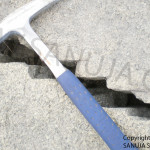
Even before we go into minute details on being a successful Geoscience student, let me explain why we use “Geoscience” as opposed to “Earth Science” or “Geology”. Geology can be loosely defined as the study of solid Earth and the processes which the Earth evolve. But it has grown into a multidisciplinary field with several different specializations. Geology itself has few different sub specializations such as hydrology, environmental, petroleum, engineering, mining and precious metal, geochemistry, etc. Additionally we have two major sectors; Geology and Geophysics. Hence I think the best way to describe all of these sub sections is to use the term “Geoscience”.
Classes and Labs
Unlike taking a degree in Business, Economics or Political Science, Geoscience degrees involve both theoretical lectures and practical labs. In some classes it is more important to pay attention to laboratory materials than to study lecture notes. In others, visualization skills are more important than analytical skills. When I was a first year student, even I was surprised about the amount of hands-on materials in Geology labs. To be successful, you must manage your time appropriately. Even if the lab components (including the lab exams) worth less, I would spend more time studying lab materials than lecture materials. However, each and every individual have their own system.
Here are few quick tips for labs:
- Spend a lot of time on identification of minerals, rocks, fossils and features.
- Ask a lot of questions from your TAs, Professors and friends.
- Always discuss with your friends when working with lab materials (do not copy each other).
- Try to relate lab materials to lectures.
- Read the lab manuals carefully because they are written specifically to cover information on your course (as opposed to textbook).
- Always pay attention to detail and create your own “tricks” to identify materials.
- Make sure to draw diagrams with proper labels, scales and key features.
- Lab samples are for all the students to use. It is not yours! Treat them with care and do not take any lab samples or equipment out of the lab without prior permission from an appropriate authority.
Here are few quick tips for lectures:
- Never skip (miss) classes unless you have to. Most Professors will provide very useful hints, tricks and tips during their lectures that may not appear on lecture handouts.
- Make useful friends (not like sitting next to a cute girl with a dumb brain) so that if you missed a class, you can get a copy of the class notes from them instead of emailing the entire 200+ students.
- Never assume anything. Always ask questions if you are not sure about something.
- Be prepared for the class. Some Professors may post the lecture notes in advanced. Read them or at least quickly go over the key titles/concepts. Never skip on reading recommended textbook pages or other materials.
Here are few tips for exams:
- Always ask questions about the exam BEFORE the exam.
- If you come across questions that you are not sure about, ask the invigilators during the exam.
- Find old exams from exam banks such as the Geology Students Union’s exam bank. Sometimes these old exams questions can show up on your exam word to word.
- For lab exams, spend at least few hours per each lab sample that will (may) be covered in the exam.
- You may want to come to the labs after hours to study. If you don’t like crowded labs, I highly recommend Friday evenings or Sunday evenings.
- Study with your friends because Geoscience is not always a clear cut science. Sometimes there is no such thing as one right answer, but rather the better answer.
- If you have any leaning difficulties or you have any disabilities, contact the appropriate office for help as soon as possible. There is always suitable help available for most students.
Additionally there are always extra help available to students in most universities and colleges in Canada. If you do not know where to go to, ask your Professor or the Students Union.
Field Work
The best advice I can give you is to have fun. Some people may panic and overdo something. It is not very productive to be panicking. However, pay attention to the safety protocols and always ask questions before you embark on misadventures. Additionally field school will allow you to think outside the box. So be an independent thinker and try to interpret formations, rocks, minerals, etc on your own before asking for help.
Homework
I find it very irritating that some people have this fixed system of studying. For example, some say that you should spend minimum of two hours studying per each hour of lecture. While this is true for almost 90% of the students, if you happen to be that exceptional one, feel free to study less. Personally I would study as much as possible because sometimes the difference between an A- and a B+ may be just that one concept that I did not study. Also please do not get caught in procrastination. Those high school last night pull offs most likely not going to work at the university level. Additionally, I have written up on Effective Study Habits tips on a previous article.
Hope all these articles help you in someway. Good luck on your academics!
